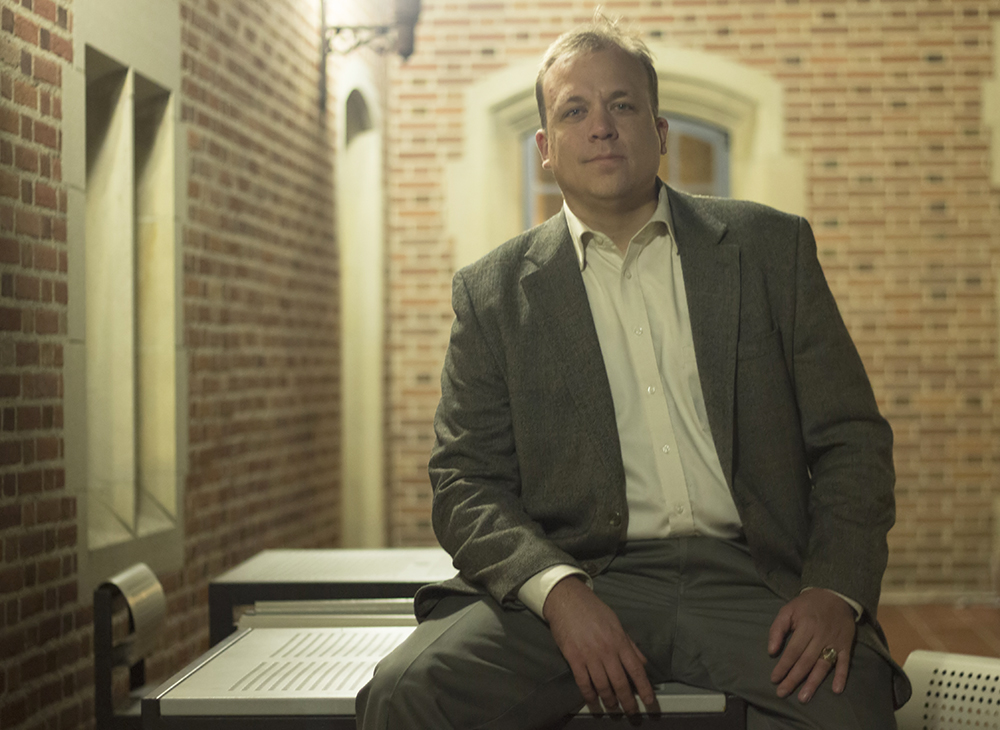Army veteran finds community and purpose at UCLA

Michael Stajura, a UCLA veteran and graduate student in public health, grew up in foster care programs and joined the U.S. Army to find structure to his life. He has since worked with disaster relief organizations around the world and helps fellow veterans find stability in their lives.
By Travis Fife
Nov. 26, 2013 12:40 a.m.
The original version of this article contained an error and has been changed. See the bottom of the article for additional information.
Michael Stajura joined the U.S. Army to find social stability, an element his life lacked while he was growing up in the foster care system.
“The whole (military) culture gives a more rigid form of structure. In fact, it was more of a foundation,” Stajura said.
Stajura, now a graduate student at the UCLA Fielding School of Public Health, said his experience in the military directed his academic focus to working with disaster relief organizations and to helping other veterans struggling to find security outside of the army.
While in the army, Stajura said he discovered his passion for helping others. When a hurricane hit Honduras while he was in the service, he led a search and rescue team to bring fresh water to schools that were secluded in the mountains.
Stajura said it felt empowering to use an army resource to help others, especially children who otherwise would not have gotten assistance.
Growing up, Stajura said he attended 14 different schools across a 13-year period. Because he moved so often at a young age, he said he often felt like an outsider.
This feeling did not go away even when he enrolled in the United States Military Academy at West Point in 1991. He continued to feel isolated because he was not used to the consistent lifestyle.
The strong military valuesdid, however, keep him grounded. While most of his youth was spent with very little order, West Point instilled in him direction, Stajura said.
After seven years in the military, Stajura said he was expected to conform back into civilian life very suddenly. But, he felt like something was missing.
It was not until doing academic research in graduate school at UCLA that Stajura realized that what was missing was purpose in his life.
He said many veterans like himself feel isolated from their classmates because of how different their life experiences are.
“(Veteran students) could not relate to students, so when they tried to connect with others it wouldn’t work,” he said.
The Military Veterans Organization at UCLA gave him a community. The organization put on events for veterans to share their stories and find commonalities with each other, which motivated him to help other veterans in his position, he said.
Andrea San Miguel, Stajura’s sister, said she remembers watching her brother have a difficult time adjusting when he came back from service.
She added that it seemed particularly difficult for him because, as an infantry officer, he had a high-level management position in the army, which made it even harder for him to relate to others.
“He is really modest and so he doesn’t like to open up and talk about his experiences,” San Miguel said.
Stajura’s military experiences have helped shape his interest in public policy and health. He originally came to UCLA to get a master’s degree in public policy, but after the recommendations of professors, he switched to public health and now studies community-based disaster relief efforts.
He volunteers with the Los Angeles Fire Department’s Community Emergency Response Team and said his experience in the army prepared him to join the response team.
Veterans often come home and feel alone because they no longer have the identity they did in the military, said Stacy Gerlich, former director of the LAFD’s Community Emergency Response Team. Programs like the Community Emergency Response Team can fill that void.
“The fit (in the response team) is really nice for veterans because they’re not really relearning something; they’re honing their skills,” Gerlich said.
San Miguel said she has noticed Stajura’s newfound sense of belonging. Now when they catch up he talks about the projects he is working on. She added she realized that people tend to victimize veterans, but sometimes all they need is a way to find a purpose in civilian life.
For Stajura, volunteer work and using his army experience to further disaster-relief efforts provided the answer. They gave him a field in which to direct his efforts.
“(Veterans) encourage others on how to navigate the Veteran’s Administration,” he said. “This offered a network where we continued to help each other.”
Now, his research attempts to create a framework so people can understand the different functions of organizations responding to disasters and how they can better help communities rebuild afterwards.
For example, Stajura said that the American Red Cross helps struggling communities rebuild after disasters, while organizations such as the fire department respond to disasters as they happen. Understanding the difference in these functions will enable organizations to better do their jobs.
Along with his academic research, Stajura helps guide veteran organizations at UCLA on how they can better reach out to veterans and volunteers at other organizations throughout Westwood.
“These veterans organizations let (me) hear stories that (show) we are all feeling the same thing,” Stajura said.
Correction: Andrea San Miguel is Michael Stajura’s sister.


